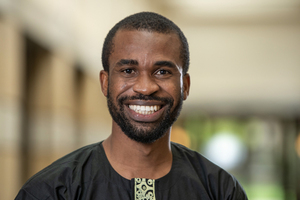
Joachim Chukwuebuka Ozonze is a Ph.D. student from Nigeria studying Peace Studies and Theology. As a Catholic priest, he studied Philosophy and Theology in his home country, which led him to receive a Master’s degree from the University of Notre Dame. In this interview, Joachim shares his hopes for opening a PeaceTech Institute and his own experience with trauma, conflict and healing.
Why study peace?
As a young boy, I grew up hearing and reading horrific stories of the Nigerian civil war, a war that ended on paper in 1970 but is still fought everyday in the memories and lives of the people. Growing up in Nigeria, I knew the smell of hatred and the experience of precarity. I remember the fight where a pregnant woman was ripped open to ensure that her baby did not survive her slaughter. I saw scarred memories erupt in dislocated bodies of violence.
I came into the program exploring how wounds and memories are transmitted across generations, how individuals and communities are socialized in and out of violence, and the possibilities of unlearning hatred. With a background in theology, I wondered whether and to what extent Christian rituals might contribute to disrupting structures of human disposability and opening spaces for personal and social healing.
Last year, with the rise of a drug crisis in Southeast Nigeria and the violent response of community leaders, I began to look at the drug crisis not simply as an isolated episode, but as an eruption of deeper structures of violence. So, zeroing in on drug violence, my current research unpacks the connections between different forms of violence, their transmission belts, and asking what personal and social healing might mean in this context.
How would you describe your experience with the Kroc Institute?
My experience with Kroc has been, to say the least, fascinating. I am thrilled by the intentional and strategic ways the program supports and positions students, beautifully weaving together rigor, expectations, incentives and friendship. Here at the Kroc, I am reminded that the study of peace begins with embodying and living out the future we envision for our world. I have enjoyed the support of faculty and staff, and the friendship of fellow doctoral students. You know this feeling of being part of a supportive community where everyone matters? Last year, for example, when I battled health challenges, my deepest worry was my inability to get work done. But, on the contrary, everyone was genuinely concerned for my health and even advised me to take some time off. It was a touching experience for me. While I was mostly drawn to Kroc by the interdisciplinary structure of the program, here I have known interdisciplinarity not simply as bringing folks from different disciplines to engage each other, but as an environment marked by mutual support, creativity, friendship and accountability, where everyone’s view mattered.
What is your dream professional path, and how is it connected to peace?
As a priest, undertaking doctoral studies was less a question of advancing some personal career, and more about living the Church’s mission of justice, peace and healing. I think that being a scholar-practitioner is one important way of living out this vocation: through publications, accompanying people to discern and walk their chosen paths as messengers of peace and healing, through advocacy and working with a community of folks united in making the world a better place for everyone. I dream of setting up a PeaceTech Institute, that would employ the potentials of digital technology in the study of peace, violence and healing. But, you know, I am still on this journey of discovering my path. I believe that our path chooses us, and, as John Paul Lederach would say, “vocation is that which stirs inside, calling out to be heard, calling out to be followed.”
Where are you on the strategic peacebuilding wheel?
I like the idea of the peacebuilding wheel because it highlights the understanding that just as episodes of violence are interconnected, strategic peace must also involve the multiple intersecting dimensions of peacebuilding. So, placing myself on a peacebuilding wheel becomes more about where and what I consider my entry point into the never static, but ever rolling wheel of strategic peacebuilding. With this understanding, my entry point into the rolling peacebuilding wheel will be the trauma healing and restorative justice arc.